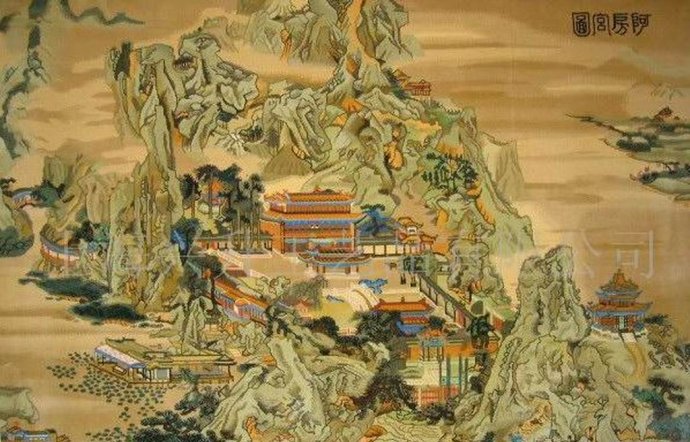小编导读:《阿房宫赋》是唐代文学家杜牧创作的一篇借古讽今的赋体散文。杜牧通过描写阿房宫的兴建及其毁灭,生动形象地总结了秦朝统治者骄奢亡国的历史经验,向唐朝统治者发出了警告,表现出一个封建时代正直的文人忧国忧民、匡世济俗的情怀。全文运用了想像、比喻与夸张等手法以及描写、铺排与议论等方式,骈句散行,错落有致。

《阿房宫赋》 杜牧
六王毕,四海一。蜀山兀,阿房出。覆压三百余里,隔离天日。骊山北构而西折,直走咸阳。二川溶溶,流入宫墙。
五步一楼,十步一阁;廊腰缦回,檐牙高啄;各抱地势,钩心斗角。盘盘焉,囷囷焉,蜂房水涡,矗不知乎几千万落。
长桥卧波,未云何龙?覆道行空,不霁何虹?高低冥迷,不知西东。
歌台暖晌,春光融融;舞殿冷袖,风雨凄凄。一日之内,一宫之间,而气候不齐。
妃嫔媵嫱,王子皇孙,辞楼下殿,辇来于秦。朝歌夜弦,为秦宫人。
明星荧荧,开妆镜也;绿云扰扰,梳晓鬟也;渭流涨腻,弃脂水也;烟斜雾横,焚椒兰也。雷霆乍掠,宫车过也;辘辘远听,杳不知其所之也。一肌一容,尽态极妍,缦立远视,而望幸焉,有不得见者,三十六年!
燕赵之收藏,韩魏之经营,齐楚之精英,几世几年,取掠其人,倚叠如山;一旦不能有,输来其间;鼎铛玉石,金块珠砾,弃掷逦迤,秦人视之,亦不甚惜。
嗟乎!一人之心,千万人之心也。秦爱纷奢,人亦念其家。奈何取之尽锱铢,用之如泥沙?使负栋之柱多于南亩之农夫;架梁之椽,多于机上之工女;钉头磷磷,多于在庾之粟粒;瓦缝参差,多于周身之帛缕;直栏横槛,多于九土之城郭;管弦呕哑,多于市人之言语。使天下之人,不敢言而敢怒。独夫之心,日益骄固。
戍卒叫,函谷举,楚人一炬,可怜焦土。
呜呼!灭六国者,六国也,非秦也。族秦者,秦也,非天下也。嗟乎,使六国各爱其人,则足以拒秦;使秦复爱六国之人,则递三世,可至万世而为君,谁得而族灭也?秦人不暇自哀,而后人哀之;后人哀之而不鉴之,亦使后人而复哀后人也。
On the Ah Fang Palace
Tu Mu
After the end of the Six Kings the empire bounded by the four seas was unified under a single ruler; and with Shu Shan stripped of its woods, the Ah Fang Palace appeared. It stretched to more than three hundred li, covering the sun in the sky; and from the north of Li-Shan it meandered to the west, and then made straightway for Hsien Yang. Two rivers flowing gently coursed their way into the palace-walls.
At each five steps there stood a storeyed building, and at each ten steps, there stood a hall, with corridors winding like waving silk, and the projecting eaves turning high up like birds’ bills. Each of the structures possessed its vantage of ground; but they were all ingeniously interlocked together, or one set against another. Some were domed, and others were curved. The courts were like so many cells in the beehive; and of the lofty eave-drippings who can tell how many millions they were.
The long bridge is lying upon the waves; how can the dragon come without clouds? The roofed causeway is stretched in the air; how can the rainbow appear without having a clearing-up sky? Both the high and the low are shrouded in the mists, and it is hard to distinguish the east from the west.
When the singing platform was re-echoed with happy songs, it was full of genial warmth of the spring; but when the dancing sleeves became cold in the dancing hall, it was chilling like wind and rain. The climate did remain the same even on the same day and in the same palace!
Noble ladies, royal princes and their children, after bidding farewell to their own chambers and halls, were all carried away to the state of Ch’in; where they practiced singing and music in the morning and evening, and became palace-men and place-women of Ch’in.
Bright stars sparking — it was mirrors laid open. Green clouds floating about — it was hair-dressing in the morning. The Wei River swelling with grease — it was made by the waste of ointment. Smoke curling up and vapour spreading — it was burning of perfume. Thunder rolling suddenly — it was the passing of palace-carriages, which one heard rumbling far off, but none could tell where it went to. Each inch of the skin was beautified to the extreme, and each movement of the body was studied to the utmost. The pretty ladies, stood gazing and looked forward to a royal visit, and some of them had not had a single dance from the king for thirty-six years.
What Yen-Chao had laid up, what Han-Wei had accumulated, and What Ch’i-Ch’u had treasured up — for many generations and years pillaged from the people — were piled up like mountains; but once they could not hold their own all were transported here. Tripods and precious stones were treated like kitchen pots and rocks. Gold and pearls were regarded as clod and pebbles. They were all scattered about in confusion, being little valued by the man of Ch’in.
Alas! Men are all like-minded, one or ten thousand. Ch’in loved splendour and luxury, and other men also coveted his house. Why should he exhaust every dram in taking in, and spend away like mud and sand — making the beam-bearing posts more than the peasants in the south fields ,the rafters on the roofs more than the female-weavers on the loom, the shining nail-caps more than the grain in the grand granaries, the uneven rows of tiles more than the silk threads all over the body, the balustrades, lengthwise and crosswise, more than the city-walls of the Nine States, sound of piped and stringed music more than the noise on the market — that the world dared to hate but not to speak, and the mind of the autocrat became daily prouder, and harder!
Behold, at the shout of the garrison guards the Hanku pass fell; and by the touch of the one torch of the man of Ch’u all became a sad stretch of scorched earth.
Alas, it was the Six States and not Ch’in that destroyed the Six States; and it was Ch’in and not the world that exterminated the clan of Ch’in. If each of the Six States had loved their own people they would have been strong enough to resist the power of Ch’in; and if Ch’in had loved the people of the Six States, he might have ruled the empire through succession from three to ten thousand generations; and who could have exterminated his clan? The man of Ch’in, having no opportunity of lamenting himself, was left to be lamented by later generations; and the later generations who lament Ch’in, but refuse to learn a lesson from him make later generations lament the later generations.






